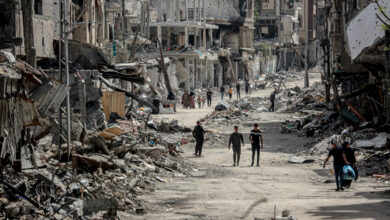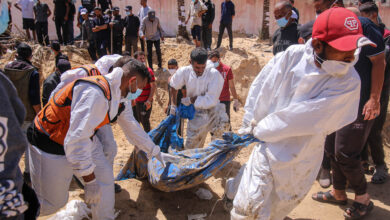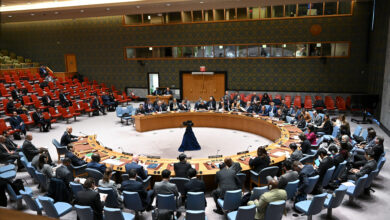Considered one of the most powerful men in Gaza, Mahmoud el-Zahar (“Abu Khaled”), co-founder of Hamas, recently gave an exclusive interview to Al-Masry Al-Youm that sent shockwaves through Egyptian and Palestinian political circles. El-Zahar, a graduate of Ein Shams medical school, alluded in the interview to what he saw as the dwindling influence of Egypt’s Foreign Ministry over the Palestinian question. His comments have been widely interpreted as a hint that Egypt’s security apparatus has been assuming a bigger role in this area. Below are excerpts from the interview.
Al-Masry Al-Youm: Is Hamas issuing directives to dig tunnels to break the blockade?
Mahmoud el-Zahar: Hamas has no relation to these tunnels. They are the result of personal initiative. Economic necessity requires that people resort to the tunnels. If I have land on the border and my cousin is on the other side, I can smuggle in 700 liters of gasoline and become a rich man. This is one of the ways Gazans manage to survive.
Al-Masry: But perhaps Hamas encouraged the building of these tunnels?
El-Zahar: Of course. The Hamas government keeps quiet about them because this is private economic activity and a way to break the blockade. And if the tunnels are used as a pretext to continue the blockade, then we are responsible for creating such a pretext. We are forced to extremes just to ensure our own survival.
Al-Masry: Haven’t the Egyptians turned a blind eye to these tunnels?
El-Zahar: I think that our brothers in Egypt need to be the ones answering such questions. We don’t want to put them in a potentially embarrassing situation. The press has a right to analyze the situation but not to put words in Hamas’ mouth in this regard.
Al-Masry: What has become of the 2005 “Cairo Declaration,” and what is standing in the way of its implementation?
El-Zahar: In 2005 we signed the Declaration and agreed to a one-year lull in fighting with Israel. We also agreed to the restructuring and reengagement of the liberation movement, but this part of the agreement was not implemented. Then again in 2007, we signed the “Mecca Agreement,” and the same thing happened. We had hoped that the Cairo Declaration would serve to prevent the same thing from happening again, but it did not.
Al-Masry: How do you justify not signing the Egyptian Reconciliation Document?
El-Zahar: Many of the document’s original articles have been changed. For example, there was an article that specified that the Palestinian Liberation organization (PLO) be reactivated and that an election commission be formed by consensus. The article was changed and now specifies that an election comission be formed through consultation. We are adamant that the commission be formed by consensus, in order to ensure that the elections are not rigged.
Al-Masry: You don’t think that such stubbornness will result in a preoccupation with endless matters of formality?
El-Zahar: Are you willing to sanction election rigging just to achieve reconciliation? That makes no sense.
Al-Masry: You give the impression that there is no hope for reconciliation. Is this true?
El-Zahar: On the contrary. There’s talk now of Hamas and Fatah sitting down and agreeing about issues they didn’t previously agree on, particularly in regard to the PLO’s Central Council. Such an agreement between Hamas and Fatah would be ratified in Cairo and blessed by the other Arab states. After that, the Egyptian Reconciliation document would be signed, and act as a reference point for the two parties, along with the Internal Palestinian Reconciliation Document. This is the proposal delivered to Amr Moussa during his visit to Gaza.
Al-Masry: Can you actually put pressure on Hamas, particularly since there is an impression that key decisions regarding the movement are not taken in Gaza but rather in Damascus and Tehran?
El-Zahar: This is a blatant mischaracterization of how things work. I previously indicated that the reason why we have not signed the Egyptian document is because some of its articles have been changed. Hamas makes one collective decision on each matter that concerns it. Whoever claims that our orders come from Damascus or elsewhere needs to check his head to see where his own orders come from.
Al-Masry: You and Abu Mazen had a personal relationship. You used to keep in contact. Has the relationship changed?
El-Zahar: Abu Mazen called me when my son Khaled was martyred. Since then we haven’t spoken. However, whenever there is a problem with one of our intermediaries, I personally contact [Fatah leader] Azzam Ahmad to explain to him our position.
Al-Masry: We have found here in Gaza a horrible feeling of division. Brothers in one house are not even speaking with each other. How do you explain this?
El-Zahar: This is true everywhere in the world. If you had real elections, the same thing would happen. However, here the disagreements are more violent. For your information, armed forces attacked my house. You can still clearly see the bullet holes. If we reconcile with Fatah we will of course need time to allow wounds to heal.
Al-Masry: Hamas continues to be displeased with Egypt despite the fact that Egypt has now opened the Rafah crossing between Gaza and Egypt for an indefinite period.
El-Zahar: This is because the border continues to function as it did in the past—only allowing passage into Egypt to Gazans seeking medical care. We want all those who do not pose a political or security threat to Egypt to be allowed entry.
Al-Masry: But Egypt faces regular attempts by Gazans to cross its border illegally. Does Egypt not have the right to defend its borders against such infiltration?
El-Zahar: These are merely examples of individual criminal cases, like anywhere else in the world, and they are not isolated to the Gaza-Egypt border. There are Africans who travel from the end of the earth to enter Israel illegally through Egypt.
If someone tries to cross the border, he is dealt with. However, if the person crossing into Egypt is a female doctor, for instance, how can security concerns be used as a justification for denying her entry into Egypt? What crime did she commit to warrant her denial? We are also attempting to disengage ourselves economically from Israel.
Al-Masry: So you agree with the statement made by Israel’s Minister of Communications that “the time has come for Egypt to bear responsibility for the Gaza Strip”?
El-Zahar: Egypt is afraid of the “specter” called Gaza, and Jordan is afraid of the West Bank. I give you my word that we have no desire for political integration into Egypt—under any circumstance. We are seeking an independent Palestinian state. This does not mean, however, that we must be economic prisoners of Israel and that Israel can do with us as it pleases. If Egypt doesn’t want economic ties with us, then at least allow us access to the Mediterranean. Keep the border crossing closed but at least allow us access to the world. We can’t be choked off economically by the crossing.
Moreover, between two to three billion dollars a year leaves Gaza and enters Israel. This money is then used to build settlements. Egypt would be better off with this money than Israel, and so would we.
Al-Masry: Are there not agreements that mandate the opening and closing of the crossings?
El-Zahar: The 2005 agreement governing the crossing expired in 2007, after its renewal. Egypt, however, continues to idolize this agreement, even though it has expired.
Al-Masry: What would be the ideal way to run the crossing?
El-Zahar: Why is a European presence needed at the crossing, as Egypt maintains its current control over it? Why can’t Egypt carry out inspections and security procedures as it wishes without the Europeans? Israel is the one insisting on a European presence, so that the Europeans can then report back to it what goes on at the crossing.
Al-Masry: Based on what we hear in the media, relations might currently be considered “strained” between Gaza and Cairo. What are your points of disagreement with Egypt?
El-Zahar: These differences are not with Egypt per se, but rather, between us and Fatah. Egypt, in its role as mediator, is displeased with this situation.
Al-Masry: The Palestinian Authority, which you are locked in struggle with, was established on the principles of the Oslo Agreement. However, Hamas rejected Oslo after being elected in accordance with the agreement Is this not a strange contradiction?
El-Zahar: No, the Oslo Agreement is not a god, nor is it something to be worshipped. It is merely an expired agreement. Besides, what parts of the agreement has Israel implemented so as to give us a reason to commit ourselves to it?
Al-Masry: During Amr Muoussa’s recent visit to Gaza, several Gazans held up signs raising the issue of detainees in Egypt. How would you characterize this issue?
El-Zahar: Yes, there are detainees in Egyptian prisons. We have raised the issue with Egypt in every possible way, and in fact this has been a heated issue between us and Cairo, especially since the Palestinian people are exerting pressure on us to deal with the matter.
Al-Masry: How many detainees are there?
El-Zahar: According to reports there are 26 detainees, the majority of whom are held on business-related charges. Others were detained after entering Egypt when the border was opened briefly in 2007. Amongst these is Ayman Nofel [an al-Qassam Brigade military operative arrested on suspicion of planning attacks in Egypt].
Al-Masry: Egyptian authorities maintain that Nofel entered through one of the underground tunnels on the Gaza-Egypt border. What are your thoughts about this?
El-Zahar: Nofel never entered Egypt by way of the tunnels—there weren’t even any tunnels at that time. Egyptian security forces say he entered through the tunnels, but I can confirm that he entered when the security barrier at the crossing was broken through in 2007. He was arrested by Egypt on the same day. The date on which he was taken into custody is the same day on which the barrier was broken through.
Al-Masry: Egypt claims that Hamas has deployed operatives with explosive belts via the underground tunnels, and that such operatives have reached as far as Upper Egypt. How would you respond to this?
El-Zahar: This is nonsense.
Al-Masry: Despite all this, you still maintain that there are no rifts between Hamas and Egypt?
El-Zahar: There are no rifts between us.
Al-Masry: We saw a harsh critique of Egypt in “Sawt el-Murabitin,” a magazine distributed in mosques throughout Gaza. Such magazines are published by Hamas and not by the public. Doesn’t this represent a clear attack on Egypt?
El-Zahar: We make great efforts to educate the public. The problem though, is that the Palestinian issue lies not in the hands of Egypt’s Foreign Ministry, but rather with other authorities. Egyptian Foreign Minister Ahmed Abu Gheit surprises me with the inflammatory statements he makes. In response, he becomes a target for criticism. Generally though, our relations with Egypt’s intelligence apparatus are good.




